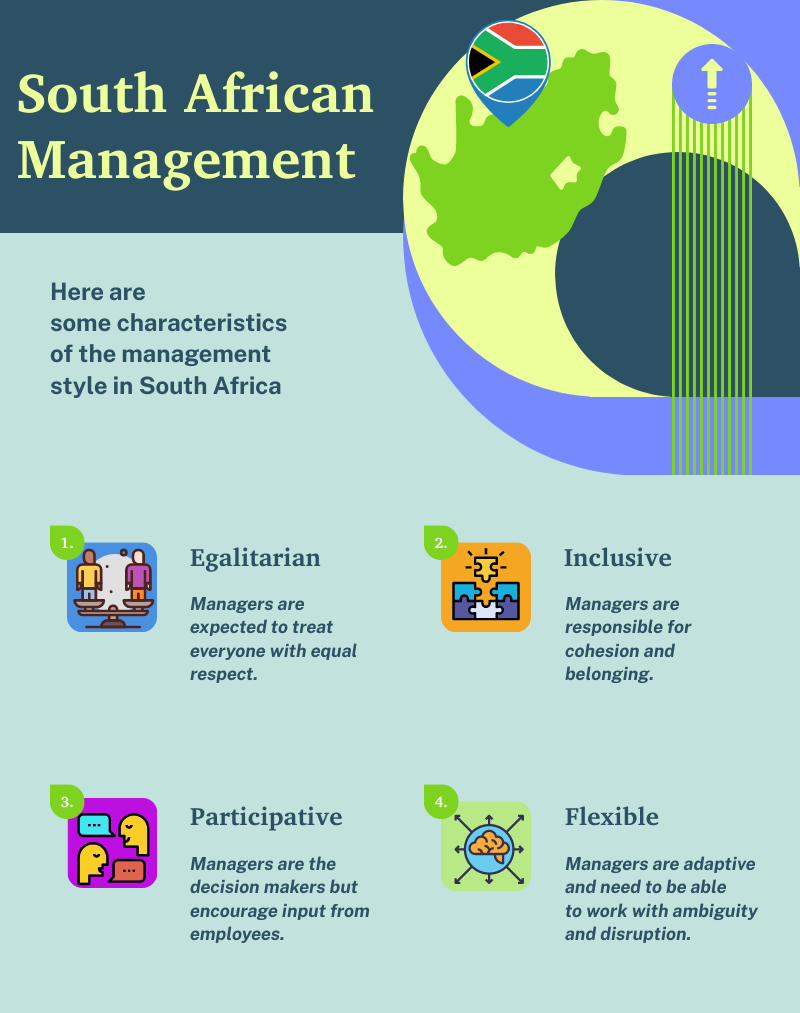
Cross Cultural Management Guide for South Africa
The cultural insights offered below are for managers who want to learn more about the management style and business practices of South Africa.
They provide some useful information for managers who are relocating to the country for employment as well as those who may have South African employees in their global or multicultural teams.
Topics include:
- Hierarchy
- Leadership style
- Time and scheduling
- Communication style
- Negotiation
Management in South Africa
Successfully managing people in South Africa depends on spending time developing personal relationships and getting to know your colleagues.
- There are strong regional differences that affect the way business is conducted.
- There may be a lack of time urgency in cities such as Cape Town that is best explained by the phrase "just now", which means immediately, just past, now, later, or sometime in the future; whereas business can be quite fast-paced in Johannesburg.
- The white "Old School Tie" or "Old Boy" network that ran major businesses two decades ago is slowly being replaced by a new generation of executives who are more interested in accomplishment than where someone went to school.
- This is a country in transition and success is more likely if you understand that you should expect to find many different management styles.
- Often the behaviour you experience will be more a matter of personality than cultural dictate.
The Role of a Manager
The management style in South Africa is a mix of local, colonial and modern. Hunhu or Ubuntu is a local philosophy which emphasizes the importance of a group or community and permeates the local culture.
- Due to the history of apartheid (racial segregation), the South African workplace today emphasises diversity, equality and inclusion.
- This has influenced the way managers run their teams, especially in that they do not display their status and look to collaborate with their colleagues.
- Most modern South African businesses apply a fairly democratic management style.
- However, the more traditional managers (especially outside the key cities) are still autocratic.
Approach to Change
According to intercultural studies, South Africa is seen to have a medium tolerance for change and risk.
- It is important for innovations to have a track record or history noting the benefits if they are to be accepted and implemented.
- The fear of exposure, and the potential of embarrassment that may accompany failure, bring about an aversion to risk.
- Because of this attitude, cultural sensitivity is going to be required, especially when conducting group meetings and discussing contributions made by participating individuals.
Approach to Time and Priorities
South Africa is a controlled-time culture, and schedule adherence is important and expected.
- Since South Africans respect schedules and deadlines, it is not unusual for managers to expect people to work late and even give up weekends in order to meet target deadlines.
- Missing a deadline is a sign of poor management and inefficiency, and will shake people’s confidence.
- While time management is important, it is not quite universal across the whole country.
Decision Making
As with many other aspects of South African business, the relationship between managers and subordinates is changing.
- Afrikaner managers were known for being autocratic; however, the management style is becoming increasingly collaborative.
- A participatory management style is apparent in local businesses where employees take part in the decisions and development of a company.
- Whether it's through suggestions or more concrete contributions, employees can play whatever role in the team they belong to.
- However, managers often direct team members to participate in a particular area to ensure that their skills are used in the best way.
Boss or Team Player?
In South Africa, managers collaborate well with their teams.
- Members are generally chosen to participate based on tangible skills or the knowledge base they bring and are equally welcome to contribute to any discussion that may arise.
- The success of a manager will depend on the individual’s ability to harness the talent of the group assembled and develop any resulting synergies.
Communication and Negotiation Styles
Although there are differences among the various ethnic groups, most South Africans have a direct style of communication. They generally speak with confidence and like to get straight to the point.
- Women are still very underrepresented in senior-level positions.
- If you are a woman, you can expect to encounter some condescending behaviour and to be tested in ways that a male colleague would not.
- Do not interrupt a South African while they are speaking.
- South Africans strive for consensus and win-win situations.
- Include delivery dates in contracts as deadlines are often viewed as fluid rather than firm commitments.
- Start negotiating with a realistic figure.

Get Expert Support
If you want to learn more, then sign up for your own customized two-hour live webinar with one of our South Africa business experts!
They can help you navigate the culture with ease.

 +44 0330 027 0207 or +1 (818) 532-6908
+44 0330 027 0207 or +1 (818) 532-6908

